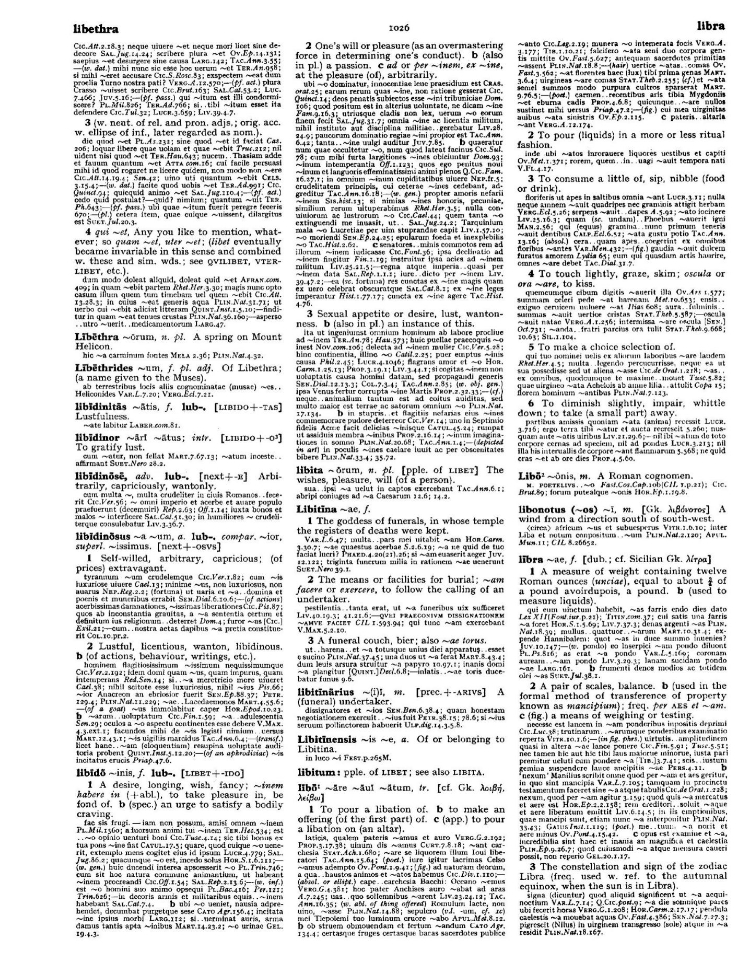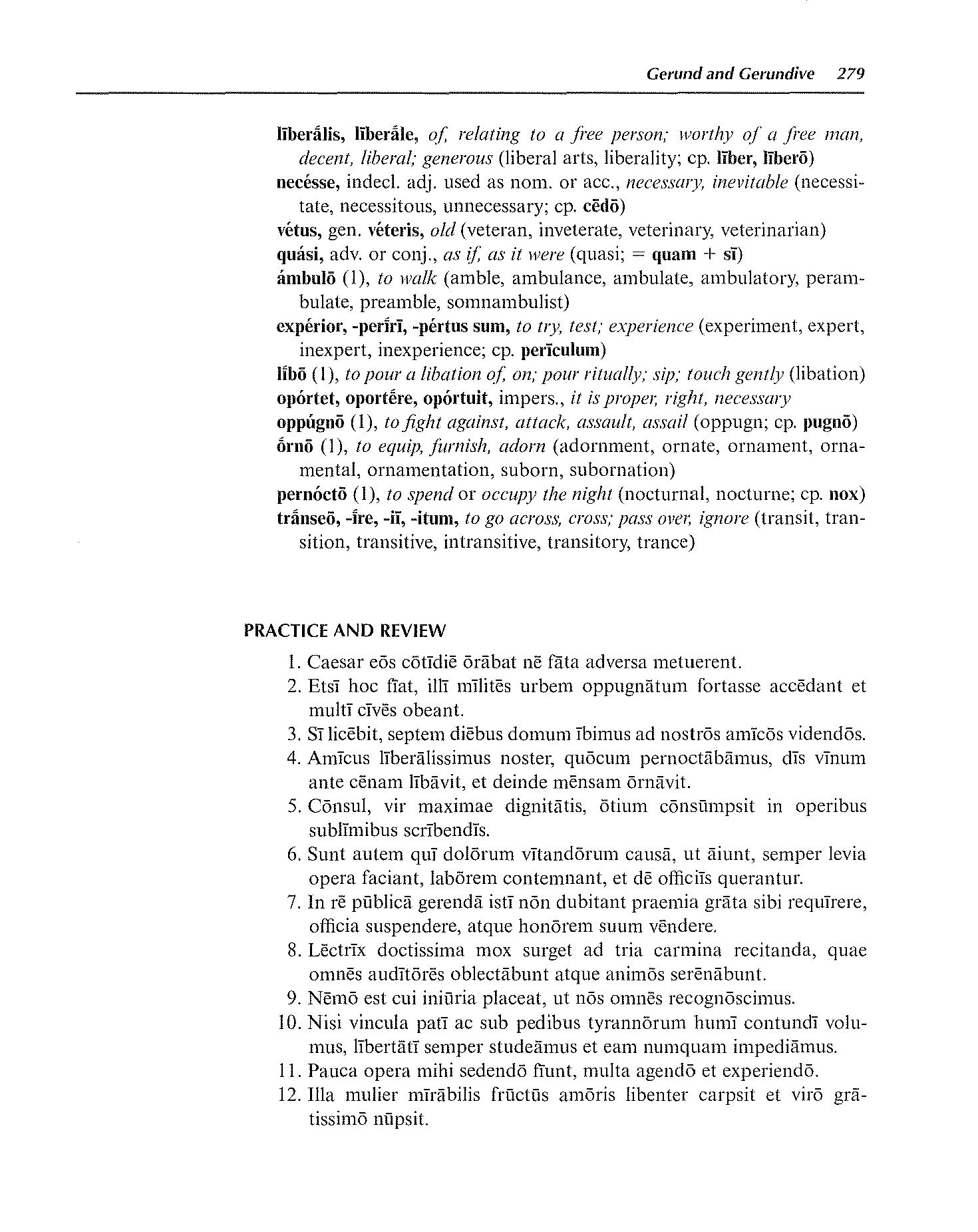
page_listing.tpl
page_subListingDetails.tpl
sub_listingDetails_style1.tpl
sub_listingDetails.title.tpl
lībāre pour ritually
lībāre is a Latin Verb that primarily means pour ritually.
Definitions for lībāre
Wheelock's Latin
Verb
- 1
to pour a libation of, on, pour ritually, sip, touch gently
English derivatives:
libation
Oxford Latin Dictionary
Verb
- 1
To pour a libation of. (b) to make an offering (of the first part) of. (c) (app) to pour a libation on (an altar).
- 2
To pour (liquids) in a more or less ritual fashion.
- 3
To consume a little of, sip, nibble (food or drink).
- 4
To touch lightly, graze, skim; oscula or ora ~are, to kiss.
- 5
To make a choice selection of.
Sentences with lībāre
Latin to English
Conjugation table for lībāre
Cactus2000
| ACTIVE | |
| Indicative present | Indicative imperfect |
| lībō lībās lībat lībāmus lībātis lībant | lībābam lībābās lībābat lībābāmus lībābātis lībābant |
| Indicative perfect | Indicative pluperfect |
| lībāvī lībāvistī lībāvit lībāvimus lībāvistis lībāvērunt / lībāvēre | lībāveram lībāverās lībāverat lībāverāmus lībāverātis lībāverant |
| Indicative future | Indicative future perfect |
| lībābō lībābis lībābit lībābimus lībābitis lībābunt | lībāverō lībāveris lībāverit lībāverimus lībāveritis lībāverint |
| Subjunctive present | Subjunctive imperfect |
| lībem lībēs lībet lībēmus lībētis lībent | lībārem lībārēs lībāret lībārēmus lībārētis lībārent |
| Subjunctive perfect | Subjunctive pluperfect |
| lībāverim lībāveris lībāverit lībāverimus lībāveritis lībāverint | lībāvissem lībāvissēs lībāvisset lībāvissēmus lībāvissētis lībāvissent |
Infinitive present lībāre Infinitive perfect lībāvisse Infinitive future lībātūrum esse | Imperative present lībā lībāte Imperative future lībātō lībātō lībātōte lībantō |
| PASSIVE | |
| Indicative present | Indicative imperfect |
| lībor lībāris lībātur lībāmur lībāminī lībantur | lībābar lībābāris / lībābāre lībābātur lībābāmur lībābāminī lībābantur |
| Indicative perfect | Indicative pluperfect |
| lībātus sum lībātus es lībātus est lībātī sumus lībātī estis lībātī sunt | lībātus eram lībātus erās lībātus erat lībātī erāmus lībātī erātis lībātī erant |
| Indicative future | Indicative future perfect |
| lībābor lībāberis / lībābere lībābitur lībābimur lībābiminī lībābuntur | lībātus erō lībātus eris lībātus erit lībātī erimus lībātī eritis lībātī erunt |
| Subjunctive present | Subjunctive imperfect |
| līber lībēris / lībēre lībētur lībēmur lībēminī lībentur | lībārer lībārēris / lībārēre lībārētur lībārēmur lībārēminī lībārentur |
| Subjunctive perfect | Subjunctive pluperfect |
| lībātus sim lībātus sīs lībātus sit lībātī sīmus lībātī sītis lībātī sint | lībātus essem lībātus essēs lībātus esset lībātī essēmus lībātī essētis lībātī essent |
Infinitive present lībārī Infinitive perfect lībātum esse Infinitive future lībātum īrī | Imperative present lībāre lībāminī Imperative future lībātor lībātor - lībāntor |
| PARTICIPLE | ||
| Participle present active | ||
| Nom. | lībāns | lībantēs |
| Gen. | lībantis | lībantium |
| Dat. | lībantī | lībantibus |
| Acc. | lībantem | lībantēs |
| Abl. | lībante | lībantibus |
| Participle future active | ||
| Nom. | lībātūrus | lībātūrī |
| Gen. | lībātūrī | lībātūrōrum |
| Dat. | lībātūrō | lībātūrīs |
| Acc. | lībātūrum | lībātūrōs |
| Abl. | lībātūrō | lībātūrīs |
| Participle perfect passive | ||
| Nom. | lībātus | lībātī |
| Gen. | lībātī | lībātōrum |
| Dat. | lībātō | lībātīs |
| Acc. | lībātum | lībātōs |
| Abl. | lībātō | lībātīs |
| Gerundive | ||
| Nom. | lībandus | lībandī |
| Gen. | lībandī | lībandōrum |
| Dat. | lībandō | lībandīs |
| Acc. | lībandum | lībandōs |
| Abl. | lībandō | lībandīs |
| Gerund | Supine | |
| Nom. | lībāre | lībātum |
| Gen. | lībandī | lībātū |
| Dat. | lībandō | |
| Acc. | lībandum | |
| Abl. | lībandō | |
Data sources
Notes
- Definitions
- Frederick M. Wheelock, Wheelock's Latin, 6th ed., rev. Richard A. LaFleur (New York, NY: HarperCollins Publishers, 2005): 279.
- P. G. W. Glare, Oxford Latin Dictionary, Vols. 1-8 (Oxford: Clarendon Press, 1982): 1026.
- Word frequencies
- Paul B. Diederich, The Frequency of Latin Words and Their Endings, PhD diss., (Columbia University, 1939).
Bibliography
Allen, Joseph H. Allen and Greenough's New Latin Grammar for Schools and Colleges: Founded on Comparative Grammar. Edited by James B. Greenough, George L. Kittredge, Albert A. Howard, and Benjamin L. D'Ooge. Boston, MA: Ginn & Company, 1903.
Crystal, David. A Dictionary of Linguistics and Phonetics. 6th ed. Oxford, UK: Blackwell Publishing, 2008.
Delatte, Louis, Suzanne Govaerts, Joseph Denooz, and Etienne Evrard. Dictionnaire fréquentiel et index inverse de la langue latine [Frequency Dictionary and Inverse Index of the Latin Language]. Liège, Belgium: Laboratoire d'analyse statistique des langues anciennes de l'Université de Liège (L.A.S.L.A.), 1981.
Diederich, Paul B. The Frequency of Latin Words and Their Endings. PhD diss., Columbia University, 1939.
Francese, Christopher. "Latin Core Vocabulary." Dickinson College Commentaries. Last modified 2014. http://dcc.dickinson.edu/latin-vocabulary-list.
Gildersleeve, Basil L., and Gonzales Lodge. Gildersleeve's Latin Grammar: Third Edition, Revised, and Enlarged. 3rd ed. London, England: Macmillan and Co., 1903.
Glare, Peter G.W. Oxford Latin Dictionary. Vols. 1-8. Oxford, England: Clarendon Press, 1982.
Krüger, Bernd. "Latin Conjugation Tables." Cactus2000. Accessed May 5, 2023. https://latin.cactus2000.de/index.en.php.
Pierson, Nick. "Sound of Text." Accessed October 26, 2019. https://soundoftext.com.
Wheelock, Frederick M. Wheelock's Latin. 6th ed. Revised by Richard A. LaFleur. New York, NY: HarperCollins Publishers, 2005.
Wiktionary Contributors. "Victionarium." Wikimedia Foundation, Inc. Updated March 18, 2019. https://la.wiktionary.org/wiki/Victionarium:Pagina_prima.
Citation
Chicago (17th ed.)
Allo Contributors. "lībō, lībāre, lībāvī, lībātum (v.) - Latin Word Definition." Allo Latin Dictionary. Last modified Never. Accessed February 20, 2026. http://ancientlanguages.org/latin/dictionary/libo-libare-libavi-libatum.
Entry created on . Last updated on Never.







